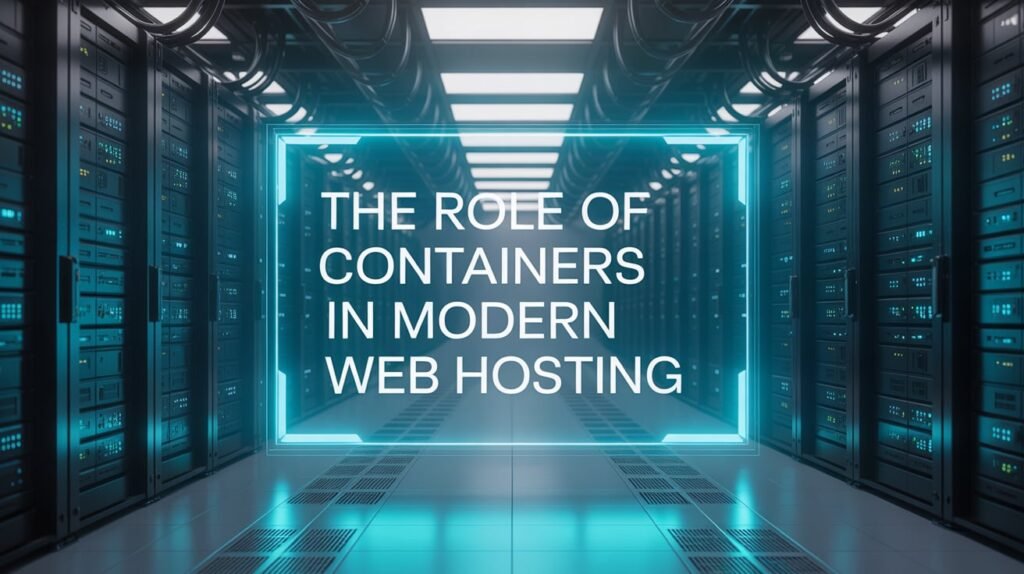The role of containers in modern web hosting has become increasingly significant as businesses demand faster, more reliable, and scalable application deployment. Technologies like Docker have introduced a lightweight, portable way to bundle applications and their dependencies into isolated environments. Kubernetes, the leading container orchestration platform, automates the management of these containers, handling tasks like scaling, load balancing, and fault tolerance. Together, they empower developers and DevOps teams to streamline workflows, reduce infrastructure overhead, and deploy web applications consistently across diverse environments. As a result, containerization is reshaping how modern web hosting is approached in cloud-native and hybrid infrastructures.
What Are Containers?
Containerization is a lightweight form of virtualization that packages applications along with their dependencies and configuration into isolated units called containers. Unlike virtual machines, containers share the same operating system kernel but run in isolated user spaces. This makes them highly efficient and portable across different environments.
Containers vs Virtual Machines
Virtual machines (VMs) simulate entire hardware systems and run full OS instances, consuming more resources. Containers, on the other hand, share the host OS kernel, start faster, and use fewer system resources, making them ideal for microservices and scalable applications.
What Is Docker and How Does It Work?
Docker is a platform for developing, shipping, and running applications using container technology. It allows developers to package applications and dependencies into a standardized unit (Docker container), ensuring consistency across environments.
Read Also: Importance of CPU Allocations in VPS Hosting Plans
What Is Kubernetes and Why Is It Important?
Kubernetes (K8s) is an open-source container orchestration platform designed to automate containerized applications’ deployment, scaling, and management. It handles scheduling containers onto a cluster of machines and manages their lifecycle.
Docker vs Kubernetes: Key Differences
Docker is primarily focused on building and running containers, whereas Kubernetes manages clusters of containers in production environments. Docker can be used independently, but Kubernetes typically requires Docker (or another container runtime) as its underlying technology.
Why Containers Matter in Web Hosting
#1. Lightweight Deployment for Fast Provisioning
- Containers can start almost instantly and require minimal system resources, which accelerates deployment times and increases server density.
#2. Consistent Environments from Development to Production
- Containers ensure that applications run the same regardless of the environment, reducing bugs related to configuration differences.
#3. Resource Efficiency and Scalability
- Containers make better use of server resources and support horizontal scaling. You can run many containers on a single machine without the overhead of multiple OS instances.
#4. Isolation and Security Benefits
- Containers offer process isolation, minimizing the risk that one application will interfere with another or access sensitive data.
Benefits of Using Docker in Web Hosting
#1. Simplified Application Deployment
- Docker simplifies the process of deploying and updating applications by packaging everything into a single image that can run anywhere.
#2. Image Versioning and Portability
- Docker allows versioning of container images, making it easy to roll back to previous versions and move workloads between environments.
#3. Integration with CI/CD Pipelines
- Docker integrates seamlessly with DevOps tools and CI/CD pipelines, enabling automated testing, building, and deployment.
Benefits of Using Kubernetes in Web Hosting
#1. Automated Scaling and Load Balancing
Kubernetes automatically adjusts the number of running containers based on traffic and system load, and distributes traffic evenly.
#2. Self-Healing and Resilience
- Kubernetes monitors the health of containers and restarts or reschedules them in case of failures, ensuring high availability.
#3. Service Discovery and Networking
- Kubernetes includes built-in service discovery and load balancing to simplify communication between containers.
#4. Centralized Configuration and Secrets Management
- Kubernetes provides mechanisms to manage application configuration and sensitive data separately from container images.
Use Cases of Containers in Web Hosting

#1. Multi-Tenant Hosting Environments
- Containers allow hosting providers to securely isolate customer environments while maximizing server usage.
#2. Microservices Architecture
- Containers are ideal for microservices, where each service runs in its container and can be independently scaled and updated.
#3. Running Headless CMS or E-commerce Apps
- Containerization supports rapid deployment and scaling of content-heavy platforms like headless CMS and online stores.
Hosting, Staging, and Development Environments
Developers can spin up containers that mimic production environments for testing and staging without affecting the live site.
#1. Learning Curve and Complexity
- Container orchestration, particularly with Kubernetes, has a steep learning curve that may be challenging for smaller teams.
#2. Monitoring and Logging in Containerized Environments
- Traditional monitoring tools may not suffice. Container environments require specialized tools for logging, metrics, and tracing.
#3. Persistent Storage and Data Management
- Handling data persistence and stateful applications in a stateless container environment requires additional tools and planning.
#4. Security Implications and Best Practices
- Misconfigured containers or images with vulnerabilities can expose security risks. Regular scanning and least-privilege access are essential.
Containers and Serverless: Are They Complementary?
#1. How Containers Fit into Modern Serverless Architectures
- Containers are increasingly used in serverless platforms (e.g., AWS Fargate) where developers deploy containers without managing servers.
#2. Hybrid Approaches in Hosting
Many modern architectures combine containers and serverless functions to optimize cost and performance based on workload type.
Container Orchestration and Automation
#1. Kubernetes for Managing Container Clusters
- Kubernetes automates the management of large-scale container environments, making it suitable for production-grade web hosting.
#2. Helm Charts and Infrastructure as Code (IaC)
- Helm simplifies Kubernetes deployments using templates. IaC tools like Terraform allow automated, repeatable infrastructure setups.
#3. Autoscaling and Rolling Updates
- Kubernetes supports autoscaling based on demand and allows rolling updates to applications with minimal downtime.
Popular Tools and Platforms for Container-Based Hosting
#1. Docker Hub, Docker Compose
- Docker Hub hosts public container images; Docker Compose helps define and run multi-container Docker applications.
#2. Kubernetes (k8s), Minikube, K3s
- Minikube and K3s are lightweight Kubernetes distributions ideal for development or edge computing.
#3. Hosting Providers Supporting Containers
- Cloud providers like AWS (ECS, EKS), Google Cloud (GKE), and Azure (AKS) offer managed container services for seamless deployment.
Security Best Practices for Containerized Hosting
#1. Image Scanning and Vulnerability Management
- Use tools to scan container images for known vulnerabilities before deployment.
#2. Role-Based Access and Namespaces in Kubernetes
- Implement RBAC and use namespaces to separate environments and restrict access.
#3. Network Policies and Container Firewalls
Use network policies to control inter-container traffic and limit exposure to threats.
Read Also: KernelCare and Why It Matters for Secure Hosting?
Future of Containers in Web Hosting
The future of containers in web hosting looks promising and transformative. As web infrastructure continues to evolve, containers are becoming foundational for deploying, scaling, and managing applications. Here’s an outline of the key trends and future directions:

#1. Mainstream Adoption and Standardization
- Ubiquity: Containers (e.g., Docker, OCI-compliant formats) are becoming the default unit of deployment across development and production environments.
- Standardization: Efforts like the Open Container Initiative (OCI) will mature, promoting interoperability between container runtimes and orchestrators.
#2. Advanced Orchestration and Automation
- Kubernetes Dominance: Kubernetes will remain central, but with more abstraction layers (e.g., K3s, OpenShift, cloud provider-specific PaaS).
- Serverless Containers: Technologies like AWS Fargate and Google Cloud Run will abstract away infrastructure concerns entirely.
- GitOps and Automation: Declarative deployments and infrastructure-as-code (e.g., ArgoCD, Flux) will automate web hosting pipelines.
#3. Enhanced Security and Isolation
- MicroVMs & Sandbox Containers: Projects like Firecracker and gVisor will blend VMs and containers to offer better isolation.
- Runtime Security: Continuous security scanning, runtime behavior analysis, and zero-trust principles will be integrated natively into container stacks.
- SBOM and Compliance: Software Bill of Materials (SBOMs) will become standard for auditing and securing containerized apps.
#4. Edge Computing and Distributed Hosting
- Lightweight Containers at the Edge: Tools like K3s and WebAssembly (Wasm) will push containerized services to edge locations for low-latency hosting.
- Federated Orchestration: Platforms will support multi-cluster, geo-distributed container deployments.
#5. Cost Optimization and Sustainability
- Bin Packing Improvements: Smarter scheduling will lead to higher resource utilization.
- Green Hosting: Containers will play a role in optimizing energy usage and enabling carbon-aware workload distribution.
#6. Multi-Cloud and Hybrid Deployments
- Portability: Containers will continue to be the vehicle for true multi-cloud and hybrid cloud strategies.
- Vendor-neutral Platforms: Tools like HashiCorp Nomad, Crossplane, and Cluster API will gain traction to avoid cloud vendor lock-in.
#7. Integration with DevOps and Platform Engineering
- Internal Developer Platforms (IDPs): Containers will underpin self-service portals for deploying, observing, and managing applications.
- CI/CD Evolution: Container-native CI/CD tools (e.g., Tekton, Dagger) will become the norm.
#8. Observability and Resilience
- Full-stack Observability: Native container observability tools will integrate tightly with Prometheus, OpenTelemetry, etc.
- Self-healing Systems: Container orchestration will include intelligent failure recovery and predictive scaling.
#9. AI and ML Integration
- Containerized ML Pipelines: Containers will simplify the reproducibility and deployment of ML models.
- AI-optimized Scheduling: Machine learning will inform orchestration strategies to optimize performance and cost.
#10. New Hosting Paradigms
- WebAssembly + Containers: Wasm will complement containers, offering a secure, fast execution model, especially in edge and browser-hosting environments.
- Composable Architecture: Micro frontends and backend-for-frontend (BFF) containers will evolve to support modular web hosting.
Conclusion
Containers have become a cornerstone of modern web hosting, offering agility, scalability, and efficiency. With tools like Docker and Kubernetes, businesses can deploy, scale, and manage applications faster and more securely than ever. Whether you’re running a personal blog or a complex enterprise platform, understanding and embracing containerization can elevate your hosting capabilities.

